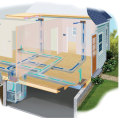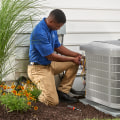Air conditioning is an essential part of life in many parts of the world, especially in hot and humid climates like Florida. Whether you're looking to replace an old air conditioner, repair a broken one, or install a new system, it's important to understand the basics of air conditioning and how it works. In this article, we'll cover the different components of an air conditioning system, the types of air conditioners available, the materials and workmanship involved in installation, and the maintenance required to keep your system running efficiently. We'll also discuss energy costs, Florida Building Code requirements for exterior door and window replacement, and permit applications.
Components of an Air Conditioning System
An air conditioning system consists of several components that work together to cool your home.The main components are the condenser unit, evaporator coil, fan motor, compressor, TXV (thermostatic expansion valve), and ductwork. The condenser unit is located outside your home and is responsible for releasing heat from the refrigerant. The evaporator coil is located inside your home and absorbs heat from the air. The fan motor circulates air over the evaporator coil to cool it down.
The compressor pumps refrigerant through the system and helps regulate the temperature. The TXV regulates the flow of refrigerant into the evaporator coil. Finally, ductwork is used to distribute cooled air throughout your home.
Types of Air Conditioners
There are several types of air conditioners available on the market today. Central air conditioners are the most common type and are connected to a central heating and cooling system.These systems use ductwork to distribute cooled air throughout your home. Mini-split systems are another popular option and consist of an outdoor condenser unit connected to one or more indoor units. These systems are ideal for homes without existing ductwork or for cooling specific areas of your home. Window units are also available and are installed directly into a window or wall opening.
Materials and Workmanship
When installing an air conditioning system, it's important to use quality materials and workmanship to ensure that your system runs efficiently and lasts for many years.Flexible ducts should be used instead of rigid metal ducts whenever possible as they are more efficient at reducing heat loss/gain. Closed-cell insulation should be used around any exposed ductwork to reduce heat loss/gain as well. It's also important to use quality materials when installing an outdoor condenser unit as they will have a direct impact on its life expectancy.
Maintenance
Regular maintenance is essential for keeping your air conditioning system running efficiently and reducing energy costs. It's important to check your system regularly for any signs of wear or damage such as leaks in the ductwork or a malfunctioning fan motor.It's also important to check the refrigerant levels in your system as low levels can cause it to run inefficiently. If you notice any problems with your system, it's best to contact a qualified HVAC specialist for repairs.
Energy Costs
Air conditioning systems can be expensive to operate due to their high energy consumption. To reduce energy costs, it's important to make sure that your system is running efficiently by regularly checking for leaks in the ductwork or a malfunctioning fan motor. It's also important to use energy-efficient materials such as flexible ducts and closed-cell insulation when installing an air conditioning system.Florida Building Code Requirements
The Florida Building Code requires that all exterior doors and windows be replaced with impact-resistant materials when installing an air conditioning system.This is done to protect against damage from high winds during storms or hurricanes. Additionally, all permit applications must include a heat loss/gain calculation that takes into account factors such as insulation levels, window size, and climate conditions.
Conclusion
Air conditioning is an essential part of life in many parts of the world, especially in hot climates like Florida. When installing an air conditioning system, it's important to use quality materials and workmanship as well as energy-efficient materials such as flexible ducts and closed-cell insulation. Additionally, all exterior doors and windows must be replaced with impact-resistant materials according to Florida Building Code requirements.Regular maintenance is also essential for keeping your system running efficiently and reducing energy costs.


